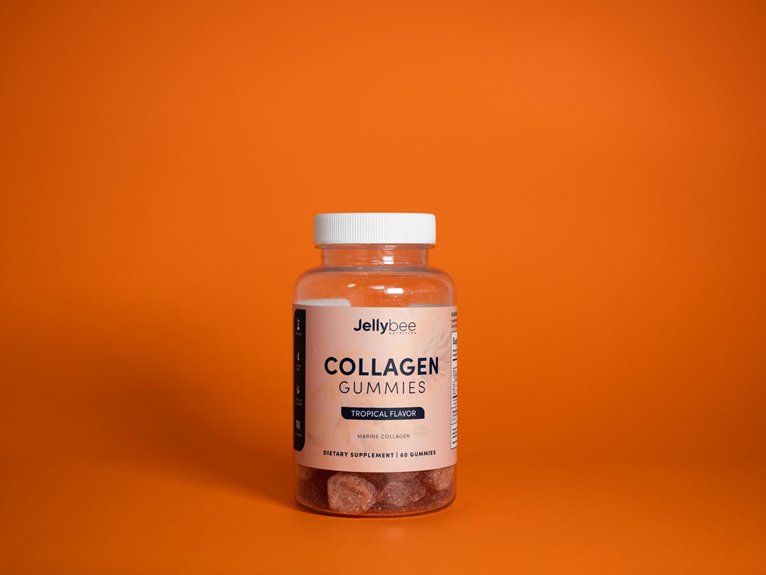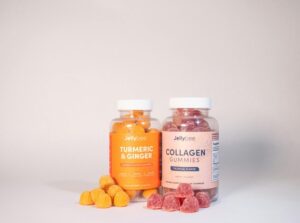
Collagen is crucial for skin elasticity and overall joint health, and understanding which foods contribute to its levels is key. You’ll find that animal-based products like chicken and fish are rich in collagen, while other foods can enhance your body’s natural production. This balance can make a significant difference in how your skin and joints feel. Curious about the specific foods that can help you achieve this? Let’s explore further.
Understanding Collagen and Its Importance
Although you mightn’t realize it, collagen plays a crucial role in maintaining the structure and elasticity of your skin, joints, and connective tissues. This protein acts as a scaffold, supporting cells and tissues throughout your body.
As you age, your body produces less collagen, leading to signs of aging like wrinkles and joint pain. Research indicates that maintaining adequate collagen levels can improve skin hydration, elasticity, and overall appearance. Additionally, collagen is vital for joint health, providing cushioning and support. Understanding its importance helps you appreciate why keeping collagen levels optimal is essential for your overall well-being. Engaging in healthy habits can aid in preserving your body’s natural collagen production, promoting long-term health benefits. Additionally, collagen loading can effectively address age-related collagen depletion, enhancing its benefits.
Foods Rich in Collagen
When you’re looking to boost your collagen intake, certain foods can play a significant role in supporting your body’s natural production.
Animal-based products, particularly those from chicken and fish, are rich sources of collagen. Skin, tendons, and cartilage contain high levels of this protein, so incorporating chicken skin or fish skin into your meals can be beneficial.
Additionally, egg whites are packed with proline, an amino acid crucial for collagen synthesis. Dairy products, like yogurt and cheese, also contribute to collagen production due to their protein content.
Lastly, incorporate leafy greens and berries, which provide vitamins and antioxidants that support collagen maintenance.
Bone Broth: A Collagen Powerhouse
Bone broth stands out as a remarkable source of collagen, making it a favorite among health enthusiasts. When you simmer animal bones—often with connective tissues—you extract collagen, gelatin, and essential amino acids that support skin, joint, and gut health.
Studies show that the collagen in bone broth can improve skin elasticity and hydration, which may reduce the appearance of wrinkles. Additionally, the gelatin derived from collagen aids digestion and promotes a healthy gut lining.
Seafood and Collagen Content
Many people may not realize that seafood also plays a significant role in collagen intake. Fish, particularly those with skin, like salmon and mackerel, are rich in collagen. The skin and connective tissues of these fish contain high levels of amino acids that are essential for collagen synthesis.
Additionally, shellfish such as shrimp and crabs offer collagen-building nutrients, including zinc and omega-3 fatty acids, which promote skin health and elasticity. Regularly incorporating seafood into your diet can therefore enhance your collagen levels.
Not only does seafood provide direct collagen, but it also supports your body’s natural production, making it a smart choice for maintaining youthful skin and strong joints. Consider adding a variety of seafood to your meals for optimal benefits.
Fruits and Vegetables That Promote Collagen Production
Incorporating a variety of fruits and vegetables into your diet can significantly boost collagen production in your body.
Vitamin C-rich foods, like oranges, strawberries, and bell peppers, are essential for collagen synthesis. These fruits and veggies help stabilize collagen molecules, enhancing their strength and longevity.
Additionally, leafy greens such as spinach and kale contain chlorophyll, which has been shown to increase collagen levels.
Avocados provide healthy fats and vitamin E, promoting skin elasticity and hydration.
Furthermore, berries are packed with antioxidants that protect collagen from damage caused by free radicals.
Protein Sources for Collagen Synthesis
While you may think of collagen primarily as a supplement, it’s important to recognize that your diet plays a crucial role in its synthesis.
Protein sources rich in amino acids, particularly glycine, proline, and hydroxyproline, are essential for collagen production. Foods like chicken, beef, fish, eggs, and dairy products provide these vital amino acids.
Additionally, plant-based options such as legumes, nuts, seeds, and whole grains can contribute to your protein intake. Bone broth is another excellent source, as it’s rich in collagen and other nutrients that support your body’s production.
Incorporating a variety of these protein sources into your meals not only supports collagen synthesis but also enhances overall health. Prioritize these foods to maximize your body’s collagen production.
Lifestyle Factors That Support Collagen Health
To maintain healthy collagen levels, it’s crucial to pay attention to various lifestyle factors beyond just diet. Regular exercise boosts circulation, ensuring nutrients reach your skin and connective tissues effectively.
Additionally, managing stress through practices like mindfulness or yoga can reduce cortisol levels, which may otherwise degrade collagen. Quality sleep is essential too; aim for 7-9 hours each night to support cellular repair and regeneration.
Avoid smoking and limit alcohol consumption, as both can accelerate collagen breakdown and impair skin health.
Lastly, protecting your skin from excessive sun exposure by using sunscreen can prevent UV damage, which significantly impacts collagen integrity.






